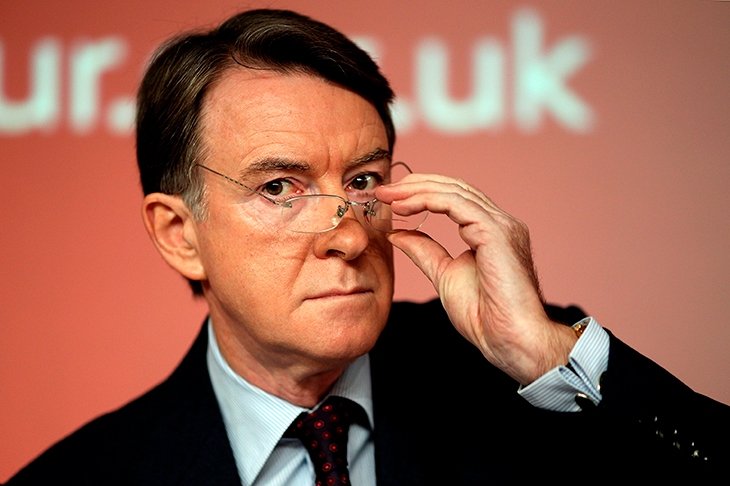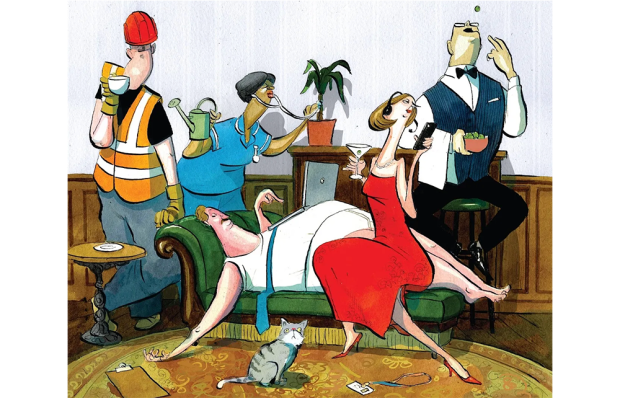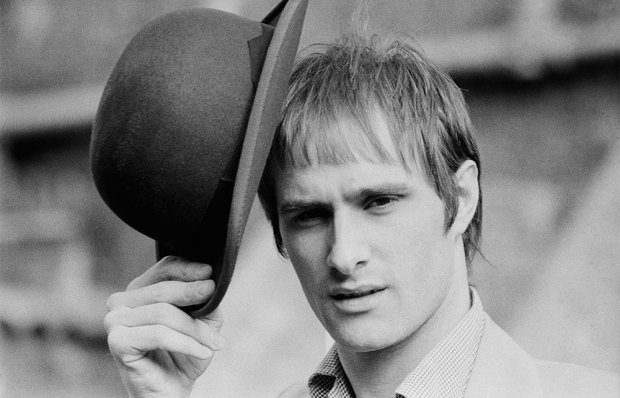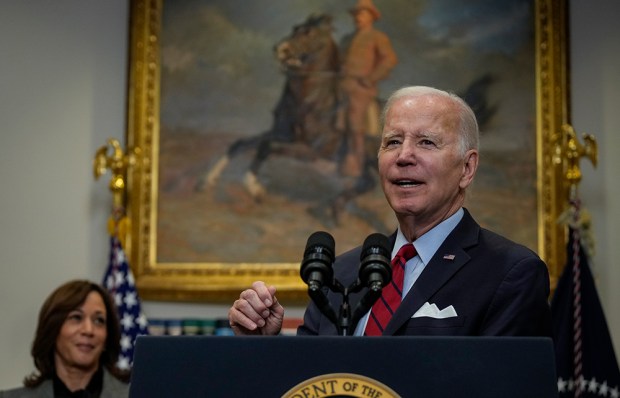Matt Forde, the stand-up comedian and presenter of his regular Political Party Podcast, has hit on an overlooked technique for getting the most out of big-name interviewees. He pretends to know nothing. Wide-eyed and star-struck (actually he is neither), Forde puts them at their ease in conversation with an apparent fanboy ingénue. ‘Do keep up, Matt,’ said Peter Mandelson, affectionately, as in his Christmas holiday interview Forde claimed to be unaware of some half-forgotten political turbulence that Lord Mandelson, his star interviewee, once encountered. It worked a treat. Lord Mandelson is normally a wary interviewee, but with Forde I have never heard him so unguarded: more confessional even than in his own autobiography.
I listened partly out of curiosity. What was Peter now saying about my run-in with him some 22 years ago? Challenged by Jeremy Paxman on Newsnight to substantiate my claim that being gay was no longer a bar to joining the cabinet, I mentioned Mandelson. Paxman’s jaw dropped. The world seemed to go crazy, Jeremy cycled off to Peter’s house that night to deliver an apology absolving himself of collusion; the press affected shock; and the BBC banned all mention of this minister’s private life.
Sacked from my column in the Sun, I feared for my whole career. But it all blew over, and in some quarters I gained kudos for being some kind of a truth-teller. Nonsense. Peter had been ‘outed’ a decade before on the front page of the News of the World, and his sexuality had often been mentioned since. I knew he’d helped Ian McKellen with our campaign against Section 28, prohibiting the endorsement in schools of homosexuality. I’d not supposed
I was revealing anything new. I was not being brave. The response bewildered me.
Forde asked about this. To my mild surprise, Peter echoed my own incredulity. He thought the BBC’s panic was bizarre. He’d never hidden his sexuality. His father, mother and all his friends had always been totally relaxed. He’d watched my interview unperturbed. But, he said, the media went mad. It was then (he told Forde) that he began to suspect a campaign of persecution. Listening, a missing piece fell into the jigsaw of my understanding. Months later, Mandelson continued, he was hounded from office after Fleet Street went wild about a mess-up over some help with a mortgage. He had, it appeared to him, been gunned down by a hostile media. I’d seemed to him like the first sniper.
I do think Peter rather over-egged his earlier relaxedness about his private life; but as he talked to Forde, for the first time in two decades I began to see things from his point of view. It could well have looked like ambush to him. In politics, those disinclined to join up the dots and spot danger often perish. In this case, Mandelson may simply have joined up too few dots into too scary a picture. I suppose I’m the only person who will ever know with absolute certainty that nobody put me up to ‘outing’ him; but nobody did — I had no agenda at all.
As the interview proceeded, Forde drew more from him that I’d never suspected. I’d always thought of Tony Blair as Mandelson’s great patron and sponsor. Peter made clear to Forde that he doesn’t see it that way. Though warm about Blair, he lamented that his prime minister never saw him as much more than a maestro of political communications.
It struck me that of the ‘new’ Labour trio of Blair, Gordon Brown and Mandelson, Peter was arguably more thinker than spinner, invested in the new Labour credo because he thought it best for Britain rather than just an election-winner for Labour. It became a habit to see him as mainly a message-maker; time and again (he told Forde) senior colleagues would revert to the assumption that they were the story, Mandelson the storyteller. ‘Is this policy right?’ engaged him deeply, but ‘How can we sell this policy?’ was the question on which his advice was more often sought. It emerged from the interview that he is, if not bitter, permanently sad about that.
I do see why. As the Times sketchwriter, I used to watch Mandelson at the Commons dispatch box. I never saw a more competent, engaged or obviously happy secretary of state than during his brief time as trade and industry secretary. His stint later as the EU trade commissioner was a natural sequel. Peter complained to Forde that he’d been wrongly pigeonholed as a PR wonk, and I think that’s true.
But Mandelson was partly complicit. He took evident pleasure in the Prince of Darkness moniker. As the years went by, he started camping up the honeyed but menacing tones. It wasn’t forced on him: the truth is more melancholy, and goes wider than Mandelson. As we age, we all of us begin to notice, as often as not unconsciously, where we most reliably get our applause, our gasps, our laughs, our audience, our brand recognition. Often without even knowing it, we start to accentuate this element in our behaviour, play along with it, our unique selling-point: play it up. In time it becomes expected of us. Yes, we’ve been trapped — and I agree Peter was — but who took the bait? Boris Johnson is trapped too — but who took the bait? Almost since boyhood, buffoonery has worked for him. By the time the self–caricature begins to constrain, to diminish, to chafe, it is often too late for reinvention.
I saw this happen to Margaret Thatcher: the cautious, hesitant, careful woman I worked for when she was opposition leader. Yes, she was always opinionated, true to her instincts, but there was so much less strut. Impulses were checked. Advice was taken. Later I watched the grande dame, the dominatrix, the Widow Twankey emerge, as cartoonists chuckled and Tory conferences cheered. She too was now trapped. She’d taken the bait. So did Peter Mandelson, a man who could have been prime minister.
Got something to add? Join the discussion and comment below.
Get 10 issues for just $10
Subscribe to The Spectator Australia today for the next 10 magazine issues, plus full online access, for just $10.
You might disagree with half of it, but you’ll enjoy reading all of it. Try your first month for free, then just $2 a week for the remainder of your first year.















Comments
Don't miss out
Join the conversation with other Spectator Australia readers. Subscribe to leave a comment.
SUBSCRIBEAlready a subscriber? Log in